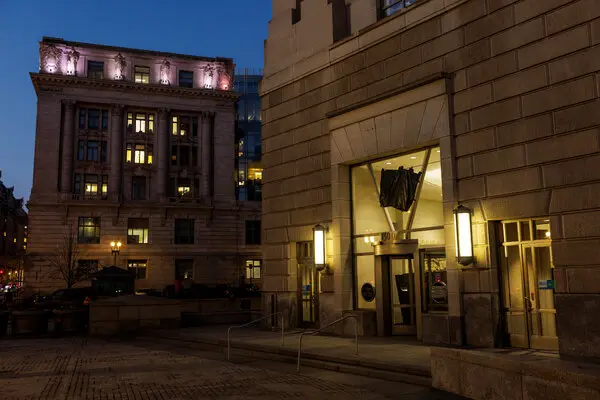The former president aims to apply political pressure to prosecutors — while revving up support for his campaign by portraying himself as a victim of Democratic persecution.
-
Send any friend a story
As a subscriber, you have “>10 gift articles to give each month. Anyone can read what you share.
Give this article

Donald J. Trump’s attempt to conflate his political and legal campaigns has been on display for weeks.
PALM BEACH, Fla. — At one end of the palatial Donald J. Trump Grand Ballroom at Mar-a-Lago on Tuesday, the former president made his first public comments about his arrest. At the opposite end of the hall — a space illuminated by 16 crystal chandeliers and bigger than four professional basketball courts — were several cardboard boxes stuffed with white campaign T-shirts.
The shirts read “I STAND WITH TRUMP,” and had a date printed on them in bold type: 03-30-2023 — the day Mr. Trump was indicted by a Manhattan grand jury for his role in a hush-money scandal.
After Mr. Trump’s indictment, it has become impossible to tell where his legal defense ends and his presidential campaign begins.
The blurring of the lines between his White House bid and his mounting court battles is at the center of a high-stakes, norm-shattering bet from Mr. Trump: that he is capable of swaying public opinion to such a degree that he can simultaneously bolster his legal case and gin up enthusiasm — and campaign contributions — from his supporters.
His legal calculation, according to aides and allies close to him, is that his pressure campaign against the Manhattan district attorney, Alvin L. Bragg, will lead to his acquittal and deter other prosecutors from seeking additional indictments — though some of his lawyers have warned him that’s unlikely.
Politically, Mr. Trump’s strategy is to paint himself as a victim of Democratic persecution, generating sympathy and good will to aid his campaign for a third consecutive Republican presidential nomination.
ImageTrump supporters outside the Manhattan courthouse where Mr. Trump was arraigned on Tuesday over his role in a hush-money payment.Credit…Ahmed Gaber for The New York Times
“President Trump isn’t just right to speak this way, he has a duty to use his bully pulpit to expose corrupt and uncontrolled prosecutors,” said Rod R. Blagojevich, a former Democratic governor of Illinois who was imprisoned for corruption until Mr. Trump commuted his sentence in 2020. “I applaud him for it.”
Mr. Trump and his allies repeatedly have made baseless accusations of wrongdoing by Mr. Bragg.
No one can say for certain whether a recent uptick for Mr. Trump in presidential primary polls has been the result of his braiding of legal and political tactics, or the recent stumbles by his chief potential Republican rival, Gov. Ron DeSantis of Florida, or some combination of the two.
But Mr. Trump’s conflation of his political and legal campaigns has been on display for weeks.
His public remarks about his arrest on Tuesday were made from the same stage — surrounded by the same “Make America Great Again” banners and American flags — where he announced his 2024 White House bid nearly five months earlier. One of the lawyers seated near Mr. Trump during his arraignment in the New York courthouse was Boris Epshteyn, who has provided both political and legal advice to the former president and other Republican candidates.
At Mr. Trump’s first major rally of the race last month in Texas, his campaign distributed “Witch Hunt” signs for the crowd to wave. The campaign has sent more than three dozen fund-raising appeals to supporters this week — each one referring to Mr. Trump’s legal battles. On Tuesday, one email solicited campaign contributions in return for T-shirts printed with a fake mug shot of the former president and the words “not guilty.” (The authorities in New York opted not to take an actual mug shot.)
“Donald Trump has been masterful at blurring the line between his own potential legal and political peril,” said Rob Godfrey, a longtime Republican strategist based in South Carolina. “But now that he faces actual legal peril, it will be fascinating to see how loyal his supporters are, whether they have the same tolerance for chaos he continues to and whether any of his opponents figure out a way to peel anyone away from him.”
Mr. Trump has long viewed public opinion as the solution to an increasingly lengthy list of personal dramas, political scandals and legal crises. He used similar tactics as president during the 22-month investigation led by Robert S. Mueller III, the special counsel, and his approval rating was virtually unchanged. Mr. Trump’s legal advisers had urged him to create a team outside the White House structure to respond publicly to the Mueller inquiry, but he declined.
One of Mr. Trump’s political high-water marks — in terms of re-election polling and fund-raising — came in February 2020, after a Republican-controlled Senate acquitted him in his first impeachment trial.
More recently, he has spent months seeking to make state and federal prosecutors investigating his behavior appear indistinguishable from the Democratic and Republican opponents actively trying to stunt his political career.
Mr. Trump has proved his skills at using investigations, impeachments and indictments to inflate his campaign coffers (and using a portion of those contributions to pay legal fees). His campaign has claimed to have raised more than $12 million from online contributions during the past week since he was indicted by the grand jury.
But his strategy in the hush-money case to mingle his legal troubles with his 2024 presidential campaign carries significant risks and masks, at least for now, potential problems.
While the Trump team has celebrated the recent influx of campaign cash, there have been questions about how many more new donors he can tap and whether he can maintain his fund-raising prowess without an immediate crisis to leverage. His only public campaign finance report so far showed a less-than-stellar haul for such a prominent political figure.
The bigger question for the former president is how attacks on the court system and law enforcement — on Wednesday he called on his party to defund the F.B.I. and Justice Department in response to his criminal indictment — will help him win back moderate Republicans and independent voters who have abandoned him, and his preferred candidates and causes, for three consecutive election cycles.
ImageAt Mr. Trump’s first big campaign rally of the 2024 race, in Waco, Texas.Credit…Christopher Lee for The New York Times
Mr. Trump has used his standing as a former president — and as the front-runner for the Republican Party’s 2024 presidential nomination — to repeatedly describe the felony charges in New York (and open criminal investigations in Georgia and Washington) as a politically motivated attack aimed at undermining his White House bid.
But that message ignores a series of electoral disappointments for Republicans since Mr. Trump’s 2016 victory made him the face of the party. Those defeats — in 2018, 2020 and 2022 — have been largely the result of a Democratic base motivated to vote against him and a significant defection of moderate Republicans turned off by his antics.
Additionally, every major investigation focusing on Mr. Trump started well before he announced his third presidential campaign. By the time he opened his White House bid in November, Mr. Trump had spent months pushing for an unusually early campaign introduction, a move intended in part to shield him from a stream of damaging revelations emerging from the investigation into his attempts to cling to power after losing the 2020 election.
Similarly, Mr. Trump has been using his legal battle to energize his enthusiastic backers and coalesce support in a divided Republican Party. While public opinion polls show Mr. Trump has a wide lead over most other primary contenders and potential rivals, about half of the party remains opposed to his candidacy.
In the Mar-a-Lago ballroom on Tuesday, Mr. Trump’s campaign set up the room with a center aisle for the former president and his V.I.P.s to walk to their seats.
The aisle resembled something a wedding party might use to make an entrance. But it also appeared to embody the very line that Mr. Trump has sought to blur: Mr. Epshteyn, one of Mr. Trump’s legal counselors, smiled and waved as the crowd cheered his arrival along with several campaign aides and family members.
“The only crime that I have committed,” Mr. Trump said a few minutes later from center stage, “is to fearlessly defend our nation from those who seek to destroy it.”
Source: nytimes.com



